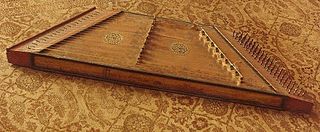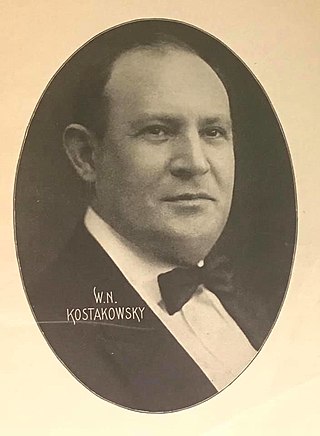Related Research Articles

The word dulcimer refers to two families of musical string instruments.

The hammered dulcimer is a percussion-stringed instrument which consists of strings typically stretched over a trapezoidal resonant sound board. The hammered dulcimer is set before the musician, who in more traditional styles may sit cross-legged on the floor, or in a more modern style may stand or sit at a wooden support with legs. The player holds a small spoon-shaped mallet hammer in each hand to strike the strings. The Graeco-Roman word dulcimer derives from the Latin dulcis (sweet) and the Greek melos (song). The dulcimer, in which the strings are beaten with small hammers, originated from the psaltery, in which the strings are plucked.

Klezmer is an instrumental musical tradition of the Ashkenazi Jews of Central and Eastern Europe. The essential elements of the tradition include dance tunes, ritual melodies, and virtuosic improvisations played for listening; these would have been played at weddings and other social functions. The musical genre incorporated elements of many other musical genres including Ottoman music, Baroque music, German and Slavic folk dances, and religious Jewish music. As the music arrived in the United States, it lost some of its traditional ritual elements and adopted elements of American big band and popular music. Among the European-born klezmers who popularized the genre in the United States in the 1910s and 1920s were Dave Tarras and Naftule Brandwein; they were followed by American-born musicians such as Max Epstein, Sid Beckerman and Ray Musiker.
Samuel Hans Adler is an American composer, conductor, author, and professor. During the course of a professional career which ranges over six decades he has served as a faculty member at both the University of Rochester's Eastman School of Music and the Juilliard School. In addition, he is credited with founding and conducting the Seventh Army Symphony Orchestra which participated in the cultural diplomacy initiatives of the United States in Germany and throughout Europe in the aftermath of World War II. Adler's musical catalogue includes over 400 published compositions. He has been honored with several awards including Germany's Order of Merit – Officer's Cross.

Simon Shaheen is a Palestinian-American oud and violin player and composer who holds Israeli citizenship.
Brave Old World is an American and German klezmer band. It formed in 1989. Members hail from the US and Germany. The Washington Post called Brave Old World "the revival's first supergroup. Every player is a virtuoso.” In 1992, the group won first prize at the International Klezmer Festival in Safed, Israel. Clarinetist Joel Rubin was a founding member.

The Klezmatics are an American klezmer music group based in New York City, who have achieved fame singing in several languages, most notably mixing older Yiddish tunes with other types of more contemporary music of differing origins. They have also recorded pieces in Aramaic and Bavarian.

David Krakauer is an American clarinetist who performs klezmer, jazz, classical music, and avant-garde improvisation.

Joel Rubin is an American clarinetist, Klezmer musician, ethnomusicologist, and scholar of Jewish music. Since becoming involved in the Klezmer revival in the late 1970s, he has been researching, teaching and performing Klezmer music and related genres. He has been a member of, or performed with, such groups as Brave Old World, the Joel Rubin Ensemble, and Veretski Pass.
Yale Strom is an American violinist, composer, filmmaker, writer, photographer and playwright. Strom is a pioneer among klezmer revivalists in conducting extensive field research in Central and Eastern Europe and the Balkans among the Jewish and Romani communities since 1981. Initially, his work focused primarily on the use and performance of klezmer music between these two groups. Gradually, his focus increased to examining all aspects of their culture, from post-World War II to the present. He was among the first of the klezmer revivalists to identify the connection between klezmer and lautare and explore that connection in his scholarly and artistic works.

Alicia Svigals is an American violinist and composer. A co-founder of the Grammy-winning band The Klezmatics, she is considered by many to be the world's foremost living klezmer fiddler.
Veretski Pass is a klezmer trio using traditional instrumentation of accordion, violin, cimbalom and bowed double bass. They are based in the United States, and are named after Verecke Pass, the mountain pass through which Magyar tribes crossed into the Carpathian basin to settle what later became the Austro-Hungarian Empire. Members of this group have previously played in other Klezmer groups such as Budowitz and Brave Old World.

Michael Alpert is a klezmer musician and Yiddish singer, songwriter, multi-instrumentalist, scholar and educator who has been called a key figure in the klezmer revitalization, beginning in the 1970s. He has performed solo and in a number of ensembles since that time, including Brave Old World, Kapelye, Khevrisa, The Brothers Nazaroff, Voices of Ashkenaz and The An-Sky Ensemble, and has collaborated with clarinetist David Krakauer, hip-hop artist Socalled, singer/songwriter/actor Daniel Kahn, bandurist Julian Kytasty, violinist Itzhak Perlman, ethnomusicologist and musician Walter Zev Feldman, trumpeter/composerFrank London and numerous others.
Pete Rushefsky is an American klezmer musician and executive director of New York City's Center for Traditional Music and Dance. He plays the cimbalom or "tsimbl" as well as the 5-string banjo.
Jewish rock is a form of contemporary Jewish religious music that is influenced by various forms of secular rock music. Pioneered by contemporary folk artists like Rabbi Shlomo Carlebach and the Diaspora Yeshiva Band, the genre gained popularity in the 1990s and 2000s with bands like Soulfarm, Blue Fringe, and Moshav Band that appealed to teens and college students, while artists like Matisyahu enjoyed mainstream crossover success.
KlezKanada is a Canadian organization for the promotion of klezmer music and Yiddish culture. Its principal program is a week-long Jewish music festival founded in 1996 that takes place annually in August at Camp B'nai B'rith in Lantier, Quebec. The organization also hosts workshops, concerts, and other educational programs in Montreal throughout the year.
H. Steiner was a klezmer violinist who recorded for two discs of violin and cimbalom duets for the Gramophone Company in around 1909. Although he had a small musical output and his biography is mostly unknown, his recordings serve an important function for Klezmer revival musicians as they are rare examples of recorded European klezmer violin style.
Jason Rosenblatt is a Canadian multi-instrumentalist and vocalist best known for his unique work on the diatonic harmonica. A protege of Howard Levy, he uses advanced techniques such as overblowing and overdrawing to play in a variety of different styles on the diatonic harmonica. Rosenblatt is a founding member of the neo-Jewish music group Shtreiml, which he formed in 2001 alongside collaborators Josh Dolgin, Thierry Arsenault and Ariel Harrod. The group's early albums, Harmonica Galitzianer (2002) and Spicy Paprikash (2004) heavily feature Rosenblatt's virtuosic, crisp clean work on the diatonic harmonica performed almost exclusively in a Klezmer or Eastern-European context. Later Shtreiml albums, Fenci's Blues (2006) and Eastern Hora (2014), recorded in collaboration with Turkish oud master Ismail Hakki Fencioglu, showcase Rosenblatt's compositional prowess as he blends elements of traditional Eastern-European and Ottoman music with a mixture of jazz, rock and funk. On his 2015 release, "Wiseman's Rag," Rosenblatt steps away from Shtreiml's Jewish music bent and instead focuses on roots, blues and jazz music. The thirteen original compositions are a mix of ragtime, jazz and blues and feature Rosenblatt on his familiar harmonica, but also on piano, organ and vocals. Rosenblatt's music can be heard in the 2017 CBC documentary "Kosher Love" and the 2019 PBS documentary "A People's Soundtrack."

Wolff N. Kostakowsky (1879–1944) was a Russian-born klezmer violinist known mostly for his publication of a book of klezmer dance tunes titled International Hebrew Wedding Music, published in New York City in 1916. That book was one of the earliest collections of klezmer repertoire published in the United States.

Stempenyu was the popular name of Iosif Druker, a klezmer violin virtuoso, bandleader and composer from Berdychiv, Russian Empire. He was one of a handful of celebrity nineteenth century Jewish folk violinists from Ukraine; others included Aron-Moyshe Kholodenko "Pedotser" and Yechiel Goyzman "Alter Chudnover" from Chudniv. Sholem Aleichem loosely based his 1888 novel Stempenyu: A Jewish Novel on the real-life Stempenyu; it was adapted into various stage and film versions in the twentieth century.
References
- ↑ George Robinson, "Sounds of the Jewish New Year", November 23, 2001
- ↑ "Jewish Music is World Music". North Adams Transcript, via Newspaper Archives. December 13, 2001 - Page 31
- ↑ Rogovoy, Seth. Tsimbl Un Fidl: Klezmer Music For Hammered Dulcimer & Violin (Elie Rosenblatt and Pete Rushefsky) (sound recording review) Sing Out! March 22, 2002
- ↑ Rainlore's World of Music. "Review of Tsimbl un Fidl: Klezmer Music for Hammered Dulcimer and Violin".